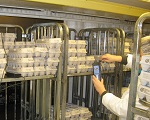The Food Safety Modernization Act was passed in 2011 and was the first major revision of food safety regulation in the United States since the 1940's.
How will FSMA regulations affect food businesses in Minnesota?
The MDA licenses and inspects food and commercial feed manufacturers in Minnesota. The FSMA created new federal regulations that will apply to food manufacturers, food distributors, and commercial feed processors and distributors in Minnesota. The Food Safety Modernization Act is the first comprehensive update to federal food safety laws since 1938. The intent is to prevent, detect, and respond to food safety problems, and increase the safety of imported foods.

Preventive Controls for Human Food Certain food manufacturers and distributors in Minnesota may need to meet new regulatory requirements to prevent contamination of food. Depending on the food and processes as well as the size of the business, food companies in Minnesota may need to comply with the Preventive Control rules starting in September of 2016. |

Preventive Controls for Animal Food Certain animal food (feed) manufacturers and distributors in Minnesota may need to meet new regulatory requirements to prevent contamination of animal food made or distributed in the state. Like human food, animal food manufacturers may need to comply with the Preventive Control rules. Additionally, animal food manufacturers will need to comply with new Current Good Manufacturing Practices (cGMPs) starting in September of 2016, depending on the size of the business. |

Produce Safety Rule (Standards for the Growing, Harvesting, Packing, and Holding of Produce for Human Consumption) Growers of 'covered' produce in Minnesota may fall under new regulations related to the Growing, Harvesting, Packing, and Holding of Produce for Human Consumption. These new rules apply to produce that is not exempt from the rule. |

Sanitary Transportation of Human and Animal Food These new regulations will cover food in transit in Minnesota and nationally. Full details of this rule are available. |

Foreign Supplier Verification Programs (FSVP) for Importers of Food for Humans and Animals The FSVP is a program that importers covered by the rule must have in place to verify that their foreign suppliers are producing food in a manner that provides the same level of public health protection as the preventive controls or produce safety regulations, as appropriate, and to ensure that the supplier's food is not adulterated and is not misbranded with respect to allergen labeling. |

Accredited Third-Party Certification This rule establishes a voluntary program for the accreditation of third-party certification bodies, also known as auditors, to conduct food safety audits and issue certifications of foreign facilities and the foods for humans and animals they produce. These requirements will help ensure the competence and independence of the accreditation bodies and third-party certification bodies participating in the program. |

